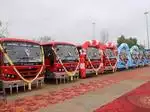Asia's Longest Flyover Opens in Nagpur: All You Need To Know
Union Minister Nitin Gadkari has inaugurated Asia’s longest flyover on October 5, a remarkable engineering feat featuring the continent’s first four-tier structure.
This innovative double-decker flyover, located near the Gaddigodam Gurudwara on the National Highway, aims to enhance urban mobility in the region.
What Makes This Flyover Unique?
- Four Levels of Connectivity: The flyover integrates four distinct modes of transportation— a Metro line at the top, followed by a vehicular flyover, a railway track, and a road at the base. This multi-layered approach brings together different types of transit, all converging at one point.
- Massive Stretch: The double-decker Kamptee Road flyover spans a total of 5.6 kilometers, connecting LIC Square to Automotive Square. This new structure surpasses Nagpur’s previous record-holding Wardha Road flyover (3.14 km) and comes with a total cost of Rs 573 crore.
With the flyover now operational, commuting from Kamptee to Nagpur Airport (about 20 km) will take just 20 minutes. According to Swarajya, the project is expected to greatly reduce travel time for daily commuters, offering a smooth and hassle-free journey across the city.
One of the major highlights of this project is the ultra-reinforced concrete technology that has been widely used in countries like Singapore and Malaysia. Minister Gadkari mentioned that this technology could be implemented in future infrastructure projects across India, potentially reducing construction costs by 20 percent.
Although the construction of the flyover began in 2019, the project faced hurdles, particularly in the busy Sadar area, where property acquisition posed challenges. However, despite these issues, the flyover was completed successfully, setting a new benchmark for urban development in Nagpur.
In addition to the flyover, Gadkari also announced redevelopment plans for Gaddigodam Market to improve traffic flow. Moreover, he praised Nagpur Metro for achieving the lowest construction cost of Rs 350 crore per kilometer, showcasing the city’s ability to set new records in infrastructure.

